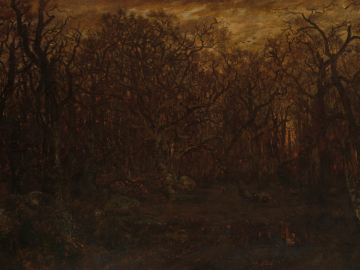‘The Loneliest Plants’: On humility and reciprocity in conservation work
Bastian Fox Phelan
In 2009, not far from the Golden Gate Bridge, botanist Dan Gluesenkamp was driving home from a conference when he noticed what he thought might be a Raven’s Manzanita – an endangered evergreen shrub native to San Francisco, with only a single wild plant known to remain. When Dan’s colleagues went back to investigate, they found the plant was indeed a rare Manzanita, but not a Raven’s. Instead, it was a Franciscan Manzanita, thought to be extinct in the wild since 1947. The species had reappeared after construction had disturbed the seed bank, and now it was threatened by further development unless steps could be taken to preserve it
*
This ‘drive-by botany story’ is explored in depth by Future Ecologies, a podcast from the Pacific Northwest about ‘the many ways we relate to our living planet’, in an episode called ‘The Loneliest Plants.’
Future Ecologies joins a growing field of longform narrative storytelling podcasts about nature, including Outside/In and Threshold. Produced and co-hosted by Adam Huggins and Mendel Skulski, Future Ecologies launched in 2018 and now has a spinoff series, Scales of Change, dedicated to ‘the dragons of climate inaction’. Each episode is built around a compelling story, evocative music and soundscapes, interviews with experts, and questions that linger in your mind long afterwards – like the question from the podcast’s first episode, ‘Decolonise This Podcast’: what does it mean for colonisers to inhabit (and podcast on) unceded, Indigenous land? As the Indigenous Plant Diva T’uy’t’tanat Cease Wyss explains, ecology is about ‘humility and reciprocity’ – and those are the things we need to work on.
*
The Franciscan Manzanita story is ‘inextricably intertwined with the stories of some of California’s greatest botanists’. Significantly, many of these botanists were women. California has an impressive history of ‘green women’ who fought for the open spaces that San Franciscans enjoy today – these women are commemorated by Rebecca Solnit in Infinite City: A San Francisco Atlas. Solnit notes that ‘the names on the land are not those of women’. Instead, places on maps are largely named after men: saints, colonisers, landowners, and some ‘green men’, as in Muir Woods.
Yet the story of the Franciscan Manzanita reveals how the accomplishments of women are embedded in local botanical history. Gluesenkamp shares the story of Lester Rowntree, who ‘succeeded as a botanist for many years because … most of the male botanists never met her’. When one of the last remaining habitats of the Franciscan Manzanita, Laurel Hill Cemetery, was about to be bulldozed, Rowntree snuck in at night and stole a plant – in her words, ‘garnered it ghoulishly in a gunnysack’.
The Franciscan Manzanita is linked to another pioneering female botanist, Alice Eastwood, who described it as a unique species in 1905. Gluesenkamp recounts how, when the Great San Francisco Earthquake struck and fires broke out across the city, Eastwood ran to the California Academy of the Sciences where she worked in the herbarium. With the marble staircase destroyed, she and her friend climbed up to the sixth floor using only the iron handrail, ‘wedging their toes between the rungs.’ Instead of saving her own research papers, she saved thousands of irreplaceable type specimens before escaping the burning building. In the meantime, her house had burned down. Later she wrote that, ‘My own destroyed work I do not lament, for it was a joy to me while I did it.’
*
Thankfully, the Franciscan Manzanita spotted by Gluesenkamp was not destroyed – it was transplanted successfully to a new location, but its dependency on human care brings up some philosophical questions that get to the heart of conservation work. As Future Ecologies puts it: ‘do species like this have any kind of future in the world that we’re creating?’ (or as the New York Times asked, ‘Should some species be allowed to die out?’) and, ‘does any species… need to go extinct?’
Gluesenkamp believes that rare plants should be protected because of their inherent value: ‘I don’t think we talk about conservation-dependent antiquities in great works of art. We accept that those marvellous paintings that we get to look at in art museums… are conservation dependent. If we don’t take care of them, we’ll lose them. And in the same way, yes, we do have some species that that are conservation dependent. But that doesn’t diminish their value.’ When Alice Eastwood saved the type specimens instead of her own papers or possessions, she made that humble choice based on what she thought was most valuable: ‘I regret nothing’ she wrote, ‘for I am rich in friends and things seem of small account.’
*
When I think about extinction, it’s easy to feel like we’re standing in a half-collapsed, burning building – everything feels urgent, everything must be saved. But only some things will survive. While writing this, the Golden Gate Bridge has been shrouded in wildfire smoke and an orange glow so bright it blots out the bridge’s signature ‘international orange’. The images would be shocking, if they didn’t seem like a replay of Australia’s 2019-20 Black Summer and its incomprehensible scale of destruction. What does it mean to care for the environment at a time when so many things are being lost, or will be lost? When we don’t know whether efforts to conserve species or restore ecosystems will be successful?
Part of the answer may lie in defining what is valuable to us and grounding our actions in humility and reciprocity. T’uy’t’tanat says, ‘It’s about how we look at what is around us and how we create a better relationship with the land, with the ecology.’ For Gluesenkamp, conservation-dependent species like the Franciscan Manzanita are not a burden, they’re a blessing: ‘We get something out of taking care of things. It is fundamental to our nature to need to take care of other humans – of other species, of systems, of things, of beliefs… it sustains us.’
If we can find joy in the work itself, in rich relationships with land and people, there will be no room for lamentation or loneliness.


